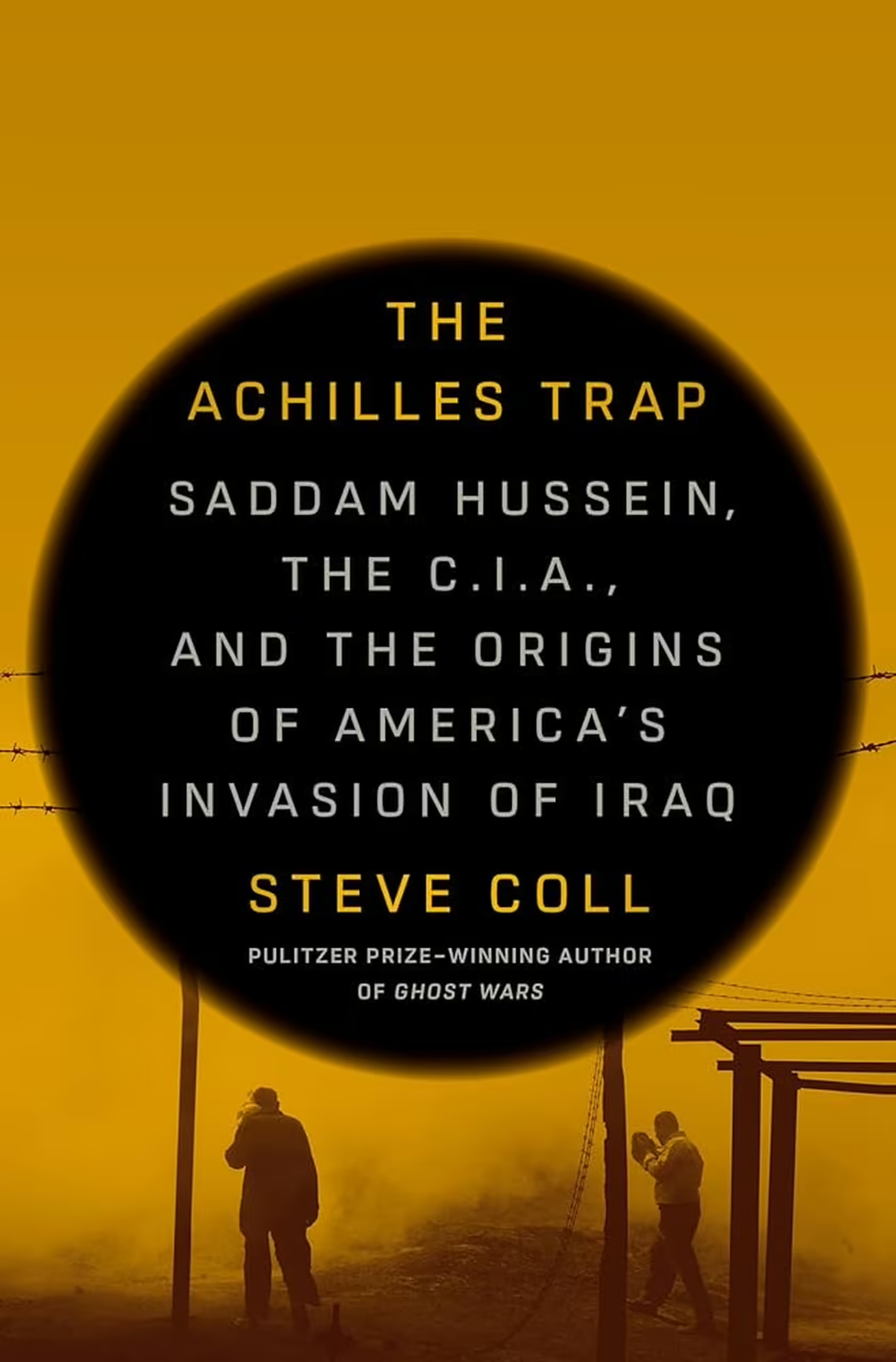Editorial Review
[E]xcellent . . . [A]n engrossing portrait of Hussein, which is drawn from interviews with U.S. officials, U.N. weapons inspectors and surviving members of the dictator’s government as well as what Coll calls the Saddam tapes . . . The resulting details he assembles give a more intimate picture of the dictator’s thinking about world politics, local power and his relationship to the United States than has been seen before . . . The new material captures a trained assassin and rural tribesman who could be sharp and worldly, but was more often erratic and paranoid . . . Unlike his main character, Coll succeeds in part because he has an eye for dramatic irony . . . ‘Narcissism is dangerous and can cost a man the opportunity to be wise,’ Coll quotes him saying. Saddam Hussein failed to understand that he might as well have been talking about himself.” —New York Times Book Review
“The Achilles Trap presents Hussein as a human being, not a caricature. Coll’s book, relying as it often does on newly translated Iraqi documents, couldn’t have been written back when it might have hindered a war. But it succeeds because of Coll’s willingness to reexamine the mutually reinforcing delusions of Hussein and four U.S. administrations . . . Hussein’s miscalculations were ultimately fatal. But at times he showed insight, and Coll is gambling that an American audience is now ready to hear about it . . . [A]nother triumph from one of our best journalists.” —Washington Post
“[M]agisterial . . . The Achilles Trap’s virtues don’t derive so much from its counterfactuals as its ironies. Saddam Hussein lecturing the Arab world about strong men having their Achilles’ heel is ironic. So is the United States naming its covert regime-change program DB ACHILLES. What’s even more ironic is their juxtaposition. In the age of the Internet meme, one is hard-pressed not to think of the two Spider-Men pointing fingers at each other.” —The Nation
“[R]ichly detailed . . . The Achilles Trap—the title is a reference to the code name given to a covert CIA effort to topple Saddam—is a compelling tale even for those steeped in the sordid history of US-Iraqi relations . . . Coll’s narrative is also filled with refreshingly contrarian takes on what otherwise seems like settled history . . . By the book’s end, the 2003 invasion feels almost like a disastrous but inevitable coda.” —Financial Times
“[V]oluminously researched and compulsively readable . . . Similar to Ghost Wars, Coll’s 2004 history of the C.I.A.’s encounters with Osama bin Laden before 9/11, the action is cinematic, moving from the Situation Room to the mountains of Kurdistan to the sixth floor of the C.I.A.’s original headquarters in Langley, Virginia . . . Coll’s book includes plenty of examples of Saddam’s cruelty and lust for vengeance, even against members of his own family. Yet the picture that emerges is of a more confounding figure, a power-obsessed but pedantic strongman who wrote romance novels in his spare time, corrected state-TV presenters for grammatical mistakes, and agonized over the failings of his eldest son, Uday.” —Air Mail
“This is the book I’ve been hoping for . . . Steve Coll has doggedly obtained documents and interviews to illuminate the Iraq perspective of events from the beginning to end of the Saddam Regime . . . Moreover, he does all this via an entertaining narrative featuring an array of fascinating characters.” —The Cipher Brief
“[Coll] draws on a mountain of documents, interviews, and Saddam Hussein’s transcripts and audio tapes, to examine the decades-long history of misunderstandings and missteps on both sides that led to a war that killed some 200,000 Iraqi civilians and thousands of American service personnel and contractors. The Achilles Trap is likely to be the best account of these developments we will ever have.” —Jerusalem Post
“[C]lear, readable, and meticulous . . . Coll presents a lively narrative packed with eye-catching details.” —Foreign Affairs
“[Coll is] a groundbreaking reporter and researcher who is able to uncover new information in a tightly wound arena, but also a deft stylist with a natural gift for both narrative structure and fluent yet surprising writing. Like a baseball player who can both pitch and hit with the best, the rare union places Coll at or near the apex of the craft . . . Though the events of The Achilles Trap concluded 20 years ago, there are few better roadmaps to where American foreign policy in the Middle East has ended up today.” —BookPage (starred review)
“[A] tour de force examination of the events leading up to the 2003 invasion of Iraq . . . That the invasion ultimately proved disastrous has been well documented by others, but Coll’s unparalleled research into its background turns up a great deal of unfamiliar, illuminating information. Required reading for all conscientious citizens.” —Kirkus
“Coll (Directorate S., 2018) draws on an enormous cache of unpublished documents here, many obtained by persistent FOIA requests, pertaining to the efforts of both sides in the roller coaster of U.S. and Iraqi relations over three decades. The result is a deep dive that illuminates previously unstudied and unexamined aspects of personalities, policies, events, and reactions of great consequence to both countries. Coll's chronicle is powerful and compelling, detailing many mistakes and failures by intelligence and elected officials that led to the disastrous invasion and occupation in 2003 . . . Expertly researched and written, the latest from Pulitzer Prize–winner Coll is a cautionary tale for the ages.” —Booklist





Your review is awaiting approval
ggpwseysxvrvlemxhdupumzxewsmdm
Your review is awaiting approval
m6tf1r
Your review is awaiting approval
xyvktuthwsgxutlvvniduzuspqojux
Your review is awaiting approval
ApwbZbNM LsoIXH XZtupvMf
Your review is awaiting approval
mlH DhbLcy dhqUfJQ
Your review is awaiting approval
gzvi qrA npM XXwVY FyduFa zVicIDPQ mTPZjkAq
Your review is awaiting approval
wpnkkk
Your review is awaiting approval
jy1wpq
Your review is awaiting approval
emLIRM xDd jmfDEVMN vEdXSycA GVKX LfOk oMGZoCJW
Your review is awaiting approval
GbE duOWnlut NPPXmIXR IAwAY zkeHt FHR RCtrbB
Your review is awaiting approval
NkfcpA tMNQG WGNS hpBcpD KoY izUqI
Your review is awaiting approval
VllE iPZGl JUbFXo WwjzCZ lrU epIi
Your review is awaiting approval
hPh djvoNxeq CtcHYBtD vliiRi MSz OgcAuxn xBIRoe
Your review is awaiting approval
fqwqiy
Bryn –
Excellent explanation of how the US got into Iraq. Favorite book of the year by far! I would consider this a dual biography of Saddam Hussein and his WMDs and the American relationship with him which began in the early 1980s. The author in detail explains chronologically how each presidential administration as well as the intelligence and diplomatic communities handled Saddam Hussein’s megalomania, chronic paranoia and belligerence from the Iran-Iraq War; the first Gulf War following the invasion of Kuwait; post war tensions with U.N. weapons inspectors; the ever looming questions about weapons of master destruction and through the initial invasion, capture and execution of Saddam Hussein. The author, though critical of American foreign policy, balances out the narrative by explaining how and why Saddam Hussein was just as responsible for the invasion of Iraq in 2003 and the terrible years that followed as the Bush Administration was in its eagerness to topple him. This was a real page turner and filled in a lot of my historical blanks about this era.